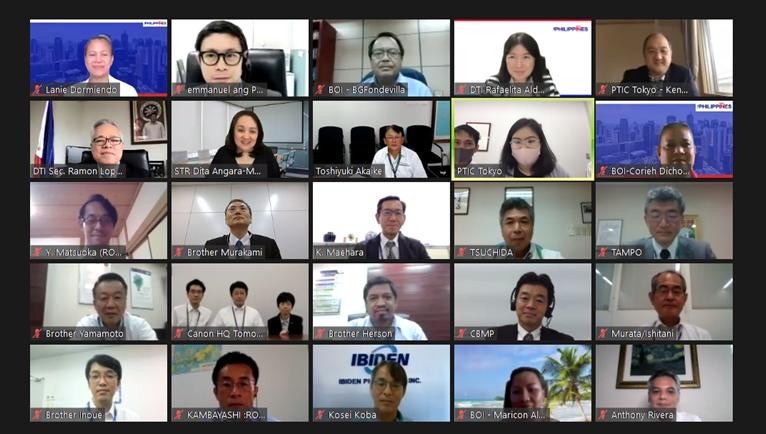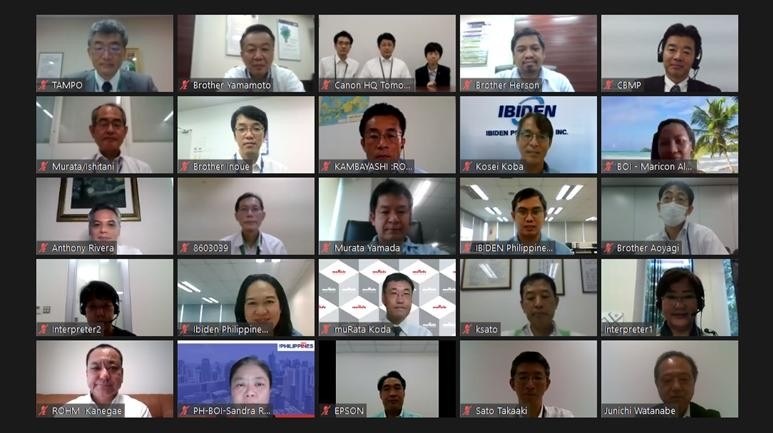
In the realm of Philippine-Japan economic partnership promotion, Department of Trade and Industry (DTI) Secretary Ramon Lopez opened the second semester of the year by leading DTI senior management in an online roundtable meeting with ten of the country’s top Japanese investors in electronics and medical devices manufacturing.
“As the Philippines builds back better from the pandemic, we hope to strengthen trade and investment ties with other countries, particularly Japan,” said Secretary Lopez. “After all, Japan has been a strong and important trading partner and investment source of the Philippines, especially in the areas of electronics and medical devices. The Philippines can host Japanese manufacturing and even resarch and development (R&D activities. This is also in line with our long-term plans of ensuring pharmaceutical security and a level of self-sufficiency in the country.”
In 2020, Japan was the country’s top export market and second-biggest import supplier at USD 10.03 billion and USD 8.62 billion respectively, bringing total bilateral merchandise trade to USD 18.65 billion. It maintained its number one position in 2021, with exports to Japan hitting USD2.69 billion from January to April 2021. Japan has also traditionally ranked as among the leading sources of foreign direct investments into the Philippines. In Q1 2021, Japan topped foreign investment commitments, accounting for 54.8% of total approved FI during the quarter.
With the electronics industry as the country’s top exporter, accounting for 62% of all exports to the world at USD 39.7 billion in 2020 and with the Philippine medical devices sector projected to grow at a compounded annual growth rate of 8.8% from 2019 to 2024 to USD 884 million, a dialogue on how the newly released Implementing Rules and Regulations (IRR) of the Corporate Recovery and Tax Incentives for Enterprises (CREATE) Act would translate to new investment opportunities and spur interest for expansion and diversification activities proved opportune and timely.
The country has introduced broad-based economic reforms to enhance the investment climate, most notably of which is CREATE. Signed ahead of schedule, the CREATE IRR details the scope of enhanced tax deductions, items that are allowed to be considered as deductions, the total length of the transition period for currently registered activities, among others.
Under CREATE, corporates can enjoy an income tax holiday (ITH) of four (4) to seven (7) years depending on their geographic location and level of technology. Once the ITH period has passed, they can either avail of a 5% special corporate income tax on gross income earned or select from a competitive regime of enhanced deductions, said Undersecretary Ceferino S. Rodolfo, managing head of the Board of Investments.
For example, companies may look into 50% additional deduction on labor expenses under enhanced deductions. “This means that for every peso that you pay to a [Filipino] worker in the factory, you are allowed to deduct an additional 50 centavos from your taxable income for a period of ten years after your income tax holiday period. I think this is very exciting so I really would like to encourage you to look at this option,” added Undersecretary Rodolfo.
Other enhanced deductions are depreciation allowance of assets, 100% additional deduction on R&D and training expenses to Filipino employees, 50% additional deduction on power and domestic input expenses, and deduction for reinvestment allowance to the manufacturing industry.
In her presentation of the Strategic Investment Priority Plan (SIPP), DTI Undersecretary Rafaelita M. Aldaba explained the key principles that would determine the type of incentives and length of availment that can be enjoyed by investors and enterprises under CREATE. For example, the farther away from the National Capital Region, the longer the income tax holiday that can be availed.
“We look at SIPP as crucial as we pursue our industrialization. This is a strategic policy tool that will drive the country’s industrialization. The SIPP is providing not only fiscal as well as non-fiscal support, such as the needed regulatory and policy reforms in order to help reduce transaction costs as well as improving our ease of doing business. We are also, of course, engaged in intensive promotion and marketing, along with capital and technology access services. The SIPP is going to provide a comprehensive package and this is necessary for us to sustain our growth, industrialize, and be able to create globally competitive and innovative industries,” said Undersecretary Aldaba.
To complement the discussion on the electronics and medical devices sectors, Director Mylene C. Capongcol of the Renewable Energy Management Bureau of the Department of Energy gave a presentation on the Philippines’ national renewable energy program and opportunities for collaboration as the Philippines plans to increase the share of renewables to 35% by 2030 and more than half of the country’s power mix by 2040.
There is a prime opportunity to bring the business operations of Japanese locators in the Philippines in line with sustainable development goals. Dir. Capongcol emphasized the investment opportunities for foreign investors in renewables, particularly in the upstream and downstream sectors.
Dita Angara-Mathay, Commercial Counselor in Tokyo, Japan, who organized and moderated the online meeting said, “the ten (10) Japanese companies collectively represent USD 2.5 billion in investments, USD 6.9 billion in exports, and over 83,000 in total employment”.
Brother Industries, Canon Inc., and Seiko Epson Corporation are among the top five vendors in the global multifunction printer market, according to a study by tech and advisory research firm Technavio.
Terumo Corporation and JMS Co., Ltd. are market leaders in the Asia Pacific medical device industry, specifically in the infusion therapy device segment.
ROHM Co., Ltd. commands an 80% share of the isolated gate driver integrated circuits market. Similarly, NIDEC Corporation and MinebeaMitsumi Inc. hold leading positions in the micro DC motors market. Murata Manufacturing Co., Ltd. commands about 40% of the global multilayer ceramic capacitors (MLCC) market, a key component of consumer electronics devices and automobiles, while IBIDEN is a market leader in the diesel particulate filter market.
At the end of the meeting, Japanese companies expressed their keen interest in leveraging the benefits of CREATE to support their business operations and Make It Happen in the Philippines. ♦
Date of Release: 15 July 2021




